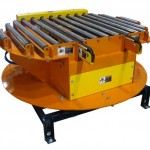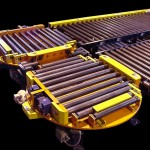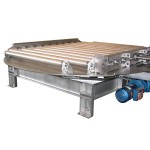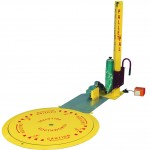Turn Tables:
Turn tables are manufactured for manual or motorized rotation in a variety of styles for a host of applications.
Standard diameters, heights, and capacities are listed below.
Non-standards can be quoted upon request.
Manual Turn Tables:
Special Low Profile Turn Table:
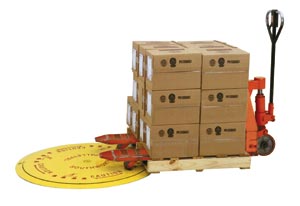
- 43-5/16” diameter deck, 48-5/8” overall (only size)
- 4000 lbs capacity
- 7/8” top of deck elevation
- Not suitable for washdown applications
- Not available in stainless steel
Standard Low Profile Turn Tables:
- 24” to 96” diameter platforms
- 30” x 30” to 120” x 120” square platforms
- 3-1/2” + minimum elevation
- Up to 10,000 lbs capacity
 Rotational limits via optional detents, locking pins, stops
Rotational limits via optional detents, locking pins, stops- Platforms supported by ball bearing rollers or cam followers
- Extra Heavy Duty Turn Tables have ring bearings
- Available in stainless steel
Ergonomic Pallet Positioning Turn Tables:
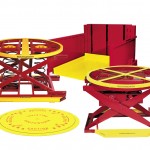 Mounted on three (3) types of elevation changing bases
Mounted on three (3) types of elevation changing bases
- Spring actuated, adjusts elevation as load increases/decreases
- Hydraulic actuation
- Pneumatic actuation
- Rotator ring diameter is 43-5/8”
- Capacity of spring actuated model is 220 lbs to 4500 lbs compressed height is 9-1/2” to extended height of 28”
- Hydraulic models come in 2000 and 4000 lbs capacity
- Pneumatic models have a capacity of 400 to 4500 lbs capacity compressed height is 9-1/2” to 30-1/2” extended height
Powered Turn Tables:
Low Profile and Standard Profile Powered Turn Tables:
- 24” to 96” diameter decks, or 48” x 48” to 120” to 120” square decks
- 2,000 to 10,000 lbs capacity
- 3-1/2” + lowered height depending on loading/application
- 0 to 10 RPMs and 0 to 5 RPMs rotation speeds available
- Bi-directional rotation
- Rotational control by limit switch, proximity switch, or PLC
- Platform is supported by a high capacity ring bearing
Items to consider when selecting a turn table for your application:
- Size and weight of the maximum load
- How the load is to be placed on the deck
- Edge loading and impact loading
- Devices such as conveyors or ball tables mounted to deck
- Rotation speed requirements
- Duty cycle
- Environmental conditions (heat/cold/damp/wet)
- Special finishes such as special paint, stainless steel, etc
- Control of turn table
Click here for more information on Conveyor Electrical Controls and Control Panels.
 Mounted on three (3) types of elevation changing bases
Mounted on three (3) types of elevation changing bases